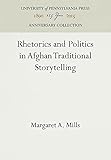Rhetorics and Politics in Afghan Traditional Storytelling / Margaret A. Mills.
Material type: TextSeries: Publications of the American Folklore Society New Series ; 12Publisher: Philadelphia : University of Pennsylvania Press, [2017]Copyright date: ©1992Edition: Reprint 2016Description: 1 online resource (408 p.)Content type:
TextSeries: Publications of the American Folklore Society New Series ; 12Publisher: Philadelphia : University of Pennsylvania Press, [2017]Copyright date: ©1992Edition: Reprint 2016Description: 1 online resource (408 p.)Content type: - 9780812281996
- 9781512804706
- online - DeGruyter
- Issued also in print.
| Item type | Current library | Call number | URL | Status | Notes | Barcode | |
|---|---|---|---|---|---|---|---|
 eBook
eBook
|
Biblioteca "Angelicum" Pont. Univ. S.Tommaso d'Aquino Nuvola online | online - DeGruyter (Browse shelf(Opens below)) | Online access | Not for loan (Accesso limitato) | Accesso per gli utenti autorizzati / Access for authorized users | (dgr)9781512804706 |
Browsing Biblioteca "Angelicum" Pont. Univ. S.Tommaso d'Aquino shelves, Shelving location: Nuvola online Close shelf browser (Hides shelf browser)

|

|

|

|

|

|

|
||
| online - DeGruyter Love in Twelfth-Century France / | online - DeGruyter Women and Credit in Pre-Industrial and Developing Societies / | online - DeGruyter Relocation in Urban Planning : From Obstacle to Opportunity / | online - DeGruyter Rhetorics and Politics in Afghan Traditional Storytelling / | online - DeGruyter Advance Agents of American Destiny / | online - DeGruyter Bibliography and Pseudo-Bibliography / | online - DeGruyter Corneille : His Heroes, and Their Worlds / |
Frontmatter -- Contents -- Preface -- A Note on Transliteration -- 1. Where We Were -- 2. What Gets Said -- 3. Khalīfah Karīm, "Mulla Mongol the Martyr" -- 4. Khalīfah Karīm, "Rasūl's Mother" -- 5. Ākhond Mulla Mahmūd, "Ten Qerān"1 -- 6. Ākhond Mulla Mahmūd, "Salīm the Jeweller" -- 7. Khalīfah Karīm, " 'Ādel Khān 'the Just' " -- 8. Ākhond Mulla Mahmūd, "Mahmūd of Ghaznī and the Thieves" -- 9. Ākhond Mulla Mahmūd, "The Old Thief with Five Sons" -- 10. Ākhond Mulla Mahmūd, "Women's Tricks" -- 11. "Fill a Pipe for the Ākhond!": The Ākhond and the Rabbi of Herat -- 12. Ākhond Mulla Mahmūd, "That Little Donkey and That Little Door" and "If/But" -- 13. Ākhond Mulla Mahmūd, "Black and White" -- 14. Khalīfah Karīm, "The Corrupt and the Good" -- 15. Khalīfah Karīm, "The Ill Fortune of the City of Rūm" -- 16. "I speak with each according to his understanding..." -- Appendix 1: Transliteration Sample -- Appendix 2: Glossary -- Appendix 3: Motif and Tale Type Index -- Bibliography -- Index
restricted access online access with authorization star
http://purl.org/coar/access_right/c_16ec
This book presents an ethnopoetic translation and an interpretation of an evening of storytelling which took place in rural Afghanistan in 1975. Three years before the Marxist coup, two Muslim elders from Herat province were asked by a Marxist subgovernor to spend an evening telling traditional stories to an American woman.The storytellers wittily integrated themes of sense and nonsense, gender and sexuality, religion and public and private social control in thirteen recorded stories, here translated in full. In interpreting texts, Margaret A. Mills argues for a rhetorical sophistication among adept traditional performers which enables them to mount performances of traditional materials which are highly, and in this case slyly, sensitive to the political and social identities of self and audience. Such identities are in part negotiated and constructed via the performances.Noting that Afghan culture has traditionally posited noninstitutional religious authority against central government institutions, Mills points out certain ironies and tensions which recur as the stories unfold in the presence of the government bureaucrat. Using this evening of stories as an example, the author asserts that the creation of narrative meaning makes use of both intertextual and interpersonal relationships. This extended performance suggests Afghan perspectives on the integration of narrative and social critique, of religious authority and private ethics, of the real and the fantastic, the serious and the ludicrous, which challenge common western notions about genres of literary production (written and oral) and social interaction.
Issued also in print.
Mode of access: Internet via World Wide Web.
In English.
Description based on online resource; title from PDF title page (publisher's Web site, viewed 27. Sep 2021)


